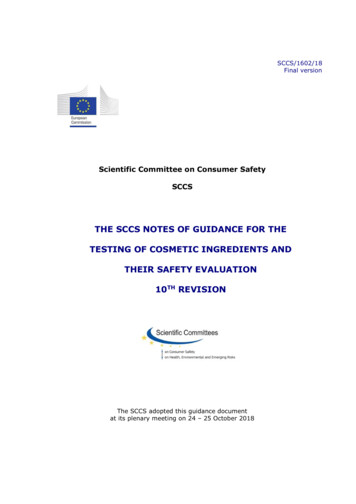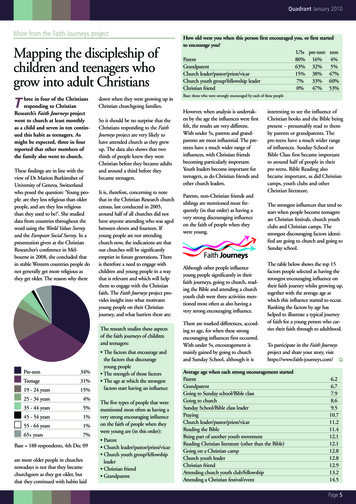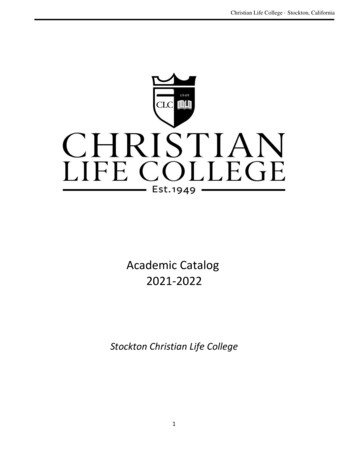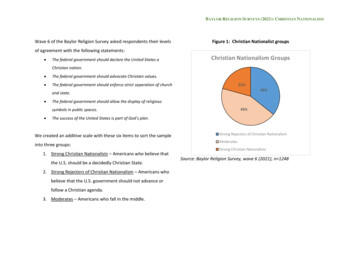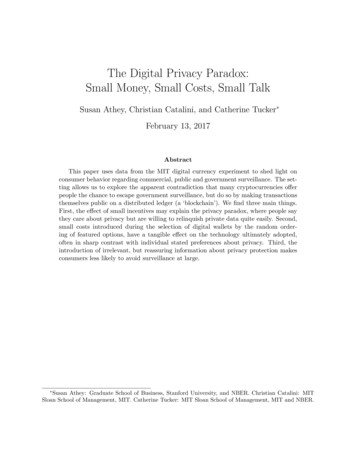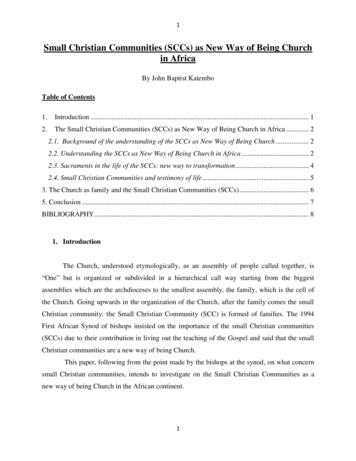
Transcription
1Small Christian Communities (SCCs) as New Way of Being Churchin AfricaBy John Baptist KatemboTable of Contents1.Introduction . 12.The Small Christian Communities (SCCs) as New Way of Being Church in Africa . 22.1. Background of the understanding of the SCCs as New Way of Being Church . 22.2. Understanding the SCCs as New Way of Being Church in Africa . 22.3. Sacraments in the life of the SCCs: new way to transformation . 42.4. Small Christian Communities and testimony of life . 53. The Church as family and the Small Christian Communities (SCCs) . 65. Conclusion . 7BIBLIOGRAPHY . 81. IntroductionThe Church, understood etymologically, as an assembly of people called together, is“One” but is organized or subdivided in a hierarchical call way starting from the biggestassemblies which are the archdioceses to the smallest assembly, the family, which is the cell ofthe Church. Going upwards in the organization of the Church, after the family comes the smallChristian community: the Small Christian Community (SCC) is formed of families. The 1994First African Synod of bishops insisted on the importance of the small Christian communities(SCCs) due to their contribution in living out the teaching of the Gospel and said that the smallChristian communities are a new way of being Church.This paper, following from the point made by the bishops at the synod, on what concernsmall Christian communities, intends to investigate on the Small Christian Communities as anew way of being Church in the African continent.1
22. The Small Christian Communities (SCCs) as new way of being Church in Africa2.1. Background of the understanding of the SCCs as new way of being ChurchIt was during the first synod for Africa that the small Christian communities came to besuggested as a new way of being church in Africa. The Bishops came back, again and again tothe SCCs as the way of being Church, which means that we must divide our parishes and ourcommunities into small groups where people can come together and share their lives togetherand read the Gospels together and ask themselves together about the will of Jesus to their lives.And so everyone can deepen his Christian faith. The bishops made it clear that together ascommunity the people can join what they believe to what they live in the SCC. Within it, theycan become active and participate in the life of the Church because they develop new ministries,lay ministries, ministry of catechesis, ministry of reconciliation, ministry to marriages, ministryto healing, ministry to the poor, ministry of justice within the Christian community and outsideit.1 Arguing in the same line of thought with the African bishops McGarry and his friends notethat:The Small Christian Communities predated the fruit of the renewed ecclesiology ofVatican II (1962-1965). The first small communities began to appear already in 1956 in Brazil,six years before the opening of Vatican II and in statements of the Catholic Bishops in DRC in1961. Certainly after Vatican II Small Christian Communities were seen all over the world aspresenting an ideal way of being the church in the way the council had envisaged. They wererecognized as the work of the Holy Spirit leading the members of the Catholic Church into alltruth, as Christ has promised.”22.2. Understanding the SCCs as New way of being Church in AfricaIn the past thirty years the Spirit has shown a new way of being church in the movementof SCCs. These vary from place to place but have certain features that are common.3 As thename implies, they are small so that people can really come to know one another and establishsupportive relationships, in contrast to the rather impersonal links among people that arecommon in parish communities. According to the pastoral Constitution to the Synod for Africa1Cf. C. MCGARRY, P. RYAN, With the Dogmatic Constitution Lumen Gentium, 265CF. MCGARRY, R. MEJIA, V. SHIRIMA, A Light on our path, A Pastoral contribution to the Synod for Africa, 134.3Cf. C. MCGARRY, R. MEJIA, V. SHIRIMA, A Light on our path, A Pastoral contribution to the Synod for Africa, 134.22
3the SCCs are: “centered on the word of God, read or studied in the actual context of themembers’ lives, and prayer, with the celebration of the Eucharist when possible; pastoral serviceand a conscious effort to live the demands of the Gospel characterize them.”4 Many SCCs try toaddress the reality of peoples’ lives in order to find creative responses that will liberate them,allowing them to be more truly themselves and more free for service to others. Such servicebuilds the community.Following from what is said above; the fact that SCCs can be called a new way of beingthe church in Africa is not an irrational fact. Some facts may justify this: the Small Christiancommunities can be recognized and evaluated. Firstly, they meet in their homes. Solidaritiesusually meet in the Church or hall. The members of Small Christian communities meet onneighborhood basis and usually rotate their place of gathering so that each has a turn in hostingthe group. The meetings need to be held on a regular basis, you cannot form community bymeeting once a year, usually they meet once a week, or once a fortnight.5 Here the smallChristian community is seen as Family of God (Ujamaa).6Secondly, the basis of their meeting is Gospel sharing. Through common reflection andsharing they meet the person of Jesus Himself. They become ever more aware of the presence ofthe risen Lord in their midst and each other. This regular sharing on the Word leads them into apersonal relationship with Christ who truly is the foundation of their community.7Thirdly, the members of a Small Christian Community look to one another’s needs. Theysee that the lonely, sick and impoverished of their neighborhood experience the caring love ofthe Lord through His disciples. They are involved in the affairs of their locality, as they wish toput into practice the love they have received from Christ through one another.8Fourthly, each Small Christian Community is in unity with the Universal Church. Visitsare made between the communities. They take turns in preparing and leading the Sunday liturgy.They sometimes meet to work or discuss together. Also, each community is in close contactwith the central parish. They have a representative on the Pastoral council. They engage in thetraining and join others for days of recollection and prayer. The full time pastoral ministersregularly visit the small communities so as to strengthen their ties with the parish as whole and4CF. MCGARRY, R. MEJIA, V. SHIRIMA, A Light on our path, A Pastoral contribution to the Synod for Africa, 134.Cf. A. PRIOR, OFM, Towards a Community Church, the Way ahead for today’s Parish, 27.6Cf. ONWUBIKO O., The Church in mission, in the light of Ecclesia in Africa, 29.7Cf. A. PRIOR, OFM, Towards a Community Church, the Way ahead for today’s Parish, 27.8Cf. A. PRIOR, OFM, Towards a Community Church, the Way ahead for today’s Parish, 27.53
4the Universal Church. The Church as a communion of the communities is an ideal which willnever be fully achieved. However, like the Christian challenge to love and forgive, it remains asa guiding star on which we set our sights. It is also a standard by which we can measure all ourpastoral programs.9In these descriptions, many aspects of the renewed ecclesiology of Vatican II are presentand can become a living reality in the communities which, in their turn become a true expressionof the church at its most basic level. The communities are ecclesial: they are not an alternative tothe church; they exist in the church and for the church, as a leaven to ferment it, as salt to give itsavor. Nor do they conceive themselves as an elite within the church but rather as people who tryto live their Christian life as fully as possible, knowing that they share responsibility for the lifeand mission of the church.102.3. Sacraments in the life of the SCCs: new way to transformationAn important aspect of the apostolate of Church in general is the celebration ofsacraments. A new way of being church cannot overlook the sacramental aspect. The smallChristian communities prove to be the new way of being church also in the fact that thesacraments are conferred to the believers with the recommendation, if not the approval of theSCC. This is another aspect which marks the small Christian communities as new way of beingchurch.In fact, SCCs have the responsibility to recommend its members to receive thesacraments. Catholic parents who want their children to be baptized need a letter ofrecommendation from their SCC. Some of the preparations for sacraments take place in theSCCs itself, for example, preparing children for the first communion.11The contribution of small Christian communities in the preparation of the faithful to thecelebration and reception of sacraments is witnessed in various ways. For instance, in theDiocese of Goma in the Democratic Republic of Congo DRC), some SCCs have started theMinistry of Accompanying the Adult Catechumens. SCCs choose a member of the SCC toaccompany him or her through the stages of the Christian Initiation of Adults. The catechumen isinvited to participate in all the activities of the SCC. In fact, as Healey notes, “Personal9Cf. A. PRIOR, OFM, Towards a Community Church, the Way ahead for today’s Parish, 27.Cf. C. MCGARRY, R. MEJIA, V. SHIRIMA, A Light on our path, A Pastoral contribution to the Synod for Africa, 134.11Cf. J. G. HEALEY, MM, Building the Church as Family of God: Evaluation of SCCs in Eastern Africa, 131.104
5relationships and friendships are an important part of helping people who are preparing forbaptism to feel at home in their local Christian community. Growth in faith is an experience ofliving in a believing community.”12 Sometimes the whole SCC accompanies its catechumens, anexample of community ministry. Here, all the SCC members are responsible for the spiritual andpastoral life of their own small community. This approach is closely related to the African valuesof community, joint responsibility, “togetherness” and sharing.13More than helping in the preparation to the celebration of sacraments, some of thesacraments are celebrated in the SCC especially the Eucharist, the sacrament of Reconciliation,the sacrament of Baptism, the sacrament of the Anointing of the Sick and the sacrament ofMatrimony. The celebration of these sacraments makes the SCCs to express their identity inAfrica as a new way of being Church. A serious on-going challenge for SCCs is to help many oftheir members to regularize their marriages in a Catholic ceremony.Many SCCs have acampaign to help their members to overcome some of the main stumbling blocks such as tofinalize the dowry and raise money for the expenses of the marriage celebration.142.4. Small Christian Communities and testimony of lifeThe Word of God proclaimed in the Church is meant to transform the life of thebelievers. Small Christian Communities have proved to be the new way of being church byinvolving the average members of the parish in the task of transforming the local situation in theSpirit of Christ. The meditation of the Gospel in the small communities can easily link faith andlife. It is in these small communities that the average person will more readily speak about theinhuman conditions they experience, and it is these very neighborhood communities which cantry to do something themselves about problems as they arise. This makes us to say withOnwumbiko that: “community per se, in African spirit, is built on the principles of familyhood,sharing, togetherness, known in East Africa as ujamaa.”15The value of fraternal communion which marked the first communities of Christians as describedin Acts 4:32 set a good example to be followed by the small Christian communities if they have12Cf. J. G. HEALEY, MM, Building the Church as Family of God: Evaluation of SCCs in Eastern Africa, 131.Cf. “Faith ‘Caught’ Rather Taught”, Story No. 64 in the African Stories Database,” African Proverbs, Sayings andthStories Website: http://www.afriprov.org/African-stories-database retrieved on 10 February,2015.14Cf. Servant of God Cardinal Maurice Otunga liked to give the example of the SCC in Nairobi Archdiocese thatdonated the bride’s wedding dress.15Cf. O. A. ONWUBIKO, African Thought, Religion and Culture, Enugu, Snaap press, 7.135
6to be the new way of being Church. In fact, as the text reads: “The whole group of believers wasunited, heart and soul; no one claimed for their own use anything that they had, as everythingthey owned was held in common.” (Acts 4:32)16 Where small communities fall into the danger ofbeing merely administrative units or mere prayer groups, the parish should seek ways ofdeveloping them beyond that stage.3. The Church as Family and the Small Christian Communities (SCCs)The SCCs, a new way of being the church, incarnate in the church the support whicharises from the joy of belonging to a family. Since the Christian life is human life, by necessity ittakes place in the context of family. Acts of solidarity, an expression of Christian charity, areoccurring in exemplary fashion in these communities.17The church models herself as family. She must work so that the family as the domesticchurch might reflect the Holy Family, where total self-giving for each other is marked byrespect, openness to others and collaboration (Cf. Mt 2:13-14, 19-23). Couples and the familyrequire particular attention. Traditional marriage sometimes obliges Christians to live on theperiphery of Christian communities. By nature, the question of Christian couples affects thefamily.The understanding of the Church as family is a fruit of the First African Synod. When wetalk of family in Africa the following elements readily come to mind: unity, solidarity,participation and co-responsibility; family-based and centered education, fecundity; the family asa place where life is welcomed, nurtured and revered; shared in common with the living and thebeing together, fraternity, mutual aid, trust, reconciliation through rites; non-gender basedrespect for age, tradition and authority; and hospitality.18 When translated into the model of theChurch these positive values offer us a living, vibrant and promising ecclesiology of the churchas family.19The fathers at the synod outline a theology of the church as family which, for practicalpurposes, could be treated on three basic levels. According to them:16Southern African Catholic Bishops’ Conference, We are the Church, 6.Cf. The First African Synod, Pope’s Opening Homily Message of the AMECEA and IMBISA Bishops, 21.18Cf. C. MCGARRY, SJ, J. CARRENO MXY, et alii, What Happened at the African Synod?, 36.19Cf. C. MCGARRY, SJ, J. CARRENO MXY, et alii, What Happened at the African Synod?, 37.176
7“the first level is the doctrinal level. In an analogical way we sometimes speak of God asfamily, that is the Trinitarian Family: Father, Son and the Holy Spirit. This family is a mystery ofunity and of communion in diversity and the second level is scriptural. The commandment tolove one another, all men and women (John 13:34; 15:12)”20.This injunction is echoed and concretely applied to life in the “way the Africansunderstand and live community life (and) perceive family life. Therefore, the model of thechurch as family emerging from this African internalization of the love of God and neighbor isthat of a church constituted by unconditional love, and not by the walls of the house. The thirdaspect is situated at the level of an African understanding of the Eucharist. The Eucharist meal isthe centre of unity, a place of gathering of the children of God. From the African perspective, thechurch as family receives its fundamental identity in the Eucharist not only because it is asharing in the Body and Blood of Christ, and in the life of the family, but because it constitutesthe centre around which the family gathers in order to evoke its ancestral memories.21The idea of the church as family is a new teaching for us which, all indications, bearsprofound consequences for life of the African church. on this point the synod fathers deservespecial commendation for highlighting the numerous pastoral implication, adaptations andapplications of the model of church as family. Let us consider some of these: The church asfamily is Home to all co-members; the church as family is Universal and Blessed with Diversity;the church as family is lived in the SCCs; it is celebrated in the Christian family and it is theplace of Dialogue.225. ConclusionThis paper has discussed the small Christian communities as new way of being thechurch. It has brought it to the surface that the SCC are a new way of being church because theyare self ministering. They involve all the members in forming a community of faith andcontribute in bringing home the lost ship. The Small Christian Communities are a place wherethe Gospel is meditated and lived, the sacraments are celebrated and lived and the life of the20CF. C. MCGARRY, SJ, J. CARRENO MXY, et alii, What Happened at the African Synod?, 38.Cf. C. MCGARRY, SJ, J. CARRENO MXY, et alii, What Happened at the African Synod?, 39.22Cf. C. MCGARRY, SJ, J. CARRENO MXY, et alii, What Happened at the African Synod?, 39.217
8church is experienced. It is the Church found in the Small Christian community and the familythat makes the parish.BIBLIOGRAPHYHEALEY J. G., MM, Building the Church as Family of God: Evaluation of SCCs in EasternAfrica, Nairobi, CUEA Press, 199-200, 2012. The Online Digital Version regularly updated fromthe 2012 print version is available as a free online Ebook containing 812 pages as of 12 October,2016 on the Small Christian Communities Global Collaborative Website es.org/images/stories/pdf/Build new.pdfMCGARRY C., RYAN P., With the Dogmatic Constitution Lumen Gentium, Nairobi: Paulines.2011.MCGARRY C., MEJIA R., V. SHIRIMA V.S, A Light on our path, A Pastoral contribution to theSynod for Africa, Nairobi: St Paul, 1992.MCGARRY C., SJ, CARRENO J. MXY, et alii, What Happened at the African Synod?Nairobi:St Paul, 1995.O. A. ONWUBIKO, African Thought, Religion and Culture, Enugu,Snaap press, 1991.ONWUBIKO O., The Church in mission, in the light of Ecclesia in Africa, Nairobi: Paulines, 2001Southern African Catholic Bishops’ Conference, We are the Church, Pastoral Directive on coresponsibility in the Church, Delmenville, Lumko, 1994.PRIOR A., OFM, Towards a Community Church, the Way ahead for today’s Parish, Nairobi,Lumko,1990.Seminarian John Baptist KatemboNairobi, Kenyajbkanzakohe@yahoo.com8
Christian community: the Small Christian Community (SCC) is formed of families. The 1994 First African Synod of bishops insisted on the importance of the small Christian communities (SCCs) due to their contribution in living out the teaching of the Gospel and said that the small Christian communities are a new way of being Church.


